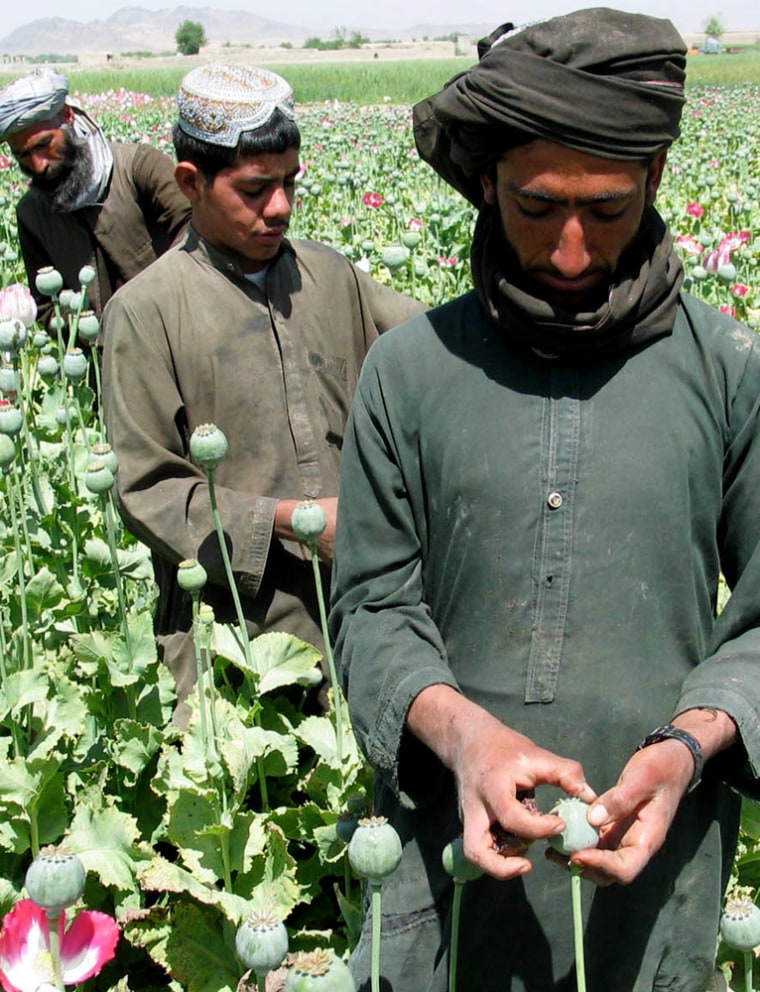Afghan farmers have begun harvesting this year’s opium crop, exposing the limits of a U.S.-sponsored crackdown on the world’s largest narcotics industry despite claims Tuesday by President Hamid Karzai that drug cultivation was down sharply.
The sobering harvest news came a day after the arrest in the United States of an Afghan accused of being one of the world’s biggest heroin traffickers and of close ties to the ousted Taliban regime.
On Tuesday morning, farmers could be seen gathering resin from opium poppies near the main road through the southern province of Kandahar, a key growing region belatedly targeted by American-trained eradication teams.
“Now, even if we do our best, we cannot eradicate it all,” in Kandahar, Gen. Mohammed Daoud, deputy interior minister for counter-narcotics, told The Associated Press. “It is a bad example for the other provinces and will make our job much harder.”
In Taliban's wake, booming business
Production of opium, the raw material for heroin, has boomed since the fall of the Taliban in 2001. Last year, cultivation reached a record 323,700 acres, yielding nearly 80 percent of world supply and buoying the economy.
Karzai last year called for a “holy war” on a trade he says could make Afghanistan an international pariah. Farmers in some areas have switched to wheat, partly for fear of eradication, and Karzai said Tuesday that U.N. and British government surveys showed cultivation was down by 30 to 40 percent.
But U.N. drug experts have cautioned that cultivation is shifting to more remote areas and rebounding opium prices could encourage a revival in planting next year.
Drug war marches on
Countries, including the United States and Britain, are pouring hundreds of millions of dollars into the anti-drug campaign. The cash is being used to train police units to destroy laboratories, arrest smugglers and destroy opium crops, as well as to fund irrigation systems and other agricultural projects to help farmers grow legal crops.
The U.S. military has promised to provide intelligence on targets and police have raided a string of laboratories in the north and east, smashing equipment and seizing drug stocks.
But Afghan authorities have yet to make a high-profile arrest to match the one announced Monday in New York, when Bashir Noorzai, an infamous Afghan drug baron, was charged with trying to smuggle more than $50 million worth of heroin into the United States.
A U.S. prosecutor said Noorzai, 44, was arrested in New York, but didn’t elaborate.
Daoud said Bashir had moved between Pakistan and Dubai, though Maj. Gen. Nadeem Ahmed, chief of Pakistan’s Anti-Narcotics Force, said intelligence reports earlier this year placed him in Afghanistan.
Both officials denied he had been detained in their territory.
Bashir was a “very big fish” still intimately involved in drug smuggling and financing Taliban militants, Daoud said.
On the ground, anti-drug efforts flounder
“The arrest was very good, but it was made abroad, and what we need is for Afghan authorities to get active and make arrests,” Daoud said.
He blamed the slow pace on sluggish legal reforms and said late funding and reluctant governors had held up the eradication campaign.
Farmers complain they have seen little of the aid supposed to soften the blow of stopping the lucrative drug trade, raising the prospect of an anti-government backlash ahead of September parliamentary elections.
“Afghans are very hopeful for their future and confident about the country, that it is going toward reconstruction,” Karzai told reporters in Kabul. “But the international community has great responsibility (to help farmers), otherwise they have to return to their old life.”
On Tuesday, wide expanses of poppy were in full bloom along the main road west out of Kandahar, and farmers were quietly gathering the opium, which will likely end up as heroin sold on the streets in countries such as Britain or Russia.
Cash crop
Mohammed Nahim, a 40-year-old working in the fields dotted with red and white flowers near the town of Maywand, said he had cultivated about 2½ acres of land with poppy because no assistance had materialized.
“A lot of money is coming for our farmers. But we didn’t get a penny, not one sack of wheat,” Nahim told an AP reporter, clutching a black plastic bag filled with thick opium paste from his poppy crop.
He said returns from opium were 10 times higher than from wheat and were the only way to cover the cost of hired tractors and diesel to pump water into his fields.
Nahim and his neighbors said they were very nervous about losing their crops to the eradication teams so close to harvest time — a factor that has contributed to violent clashes with farmers in Kandahar and other provinces in recent weeks.
“Now I am very relieved,” Nahim said. “This poppy is my gold.”
